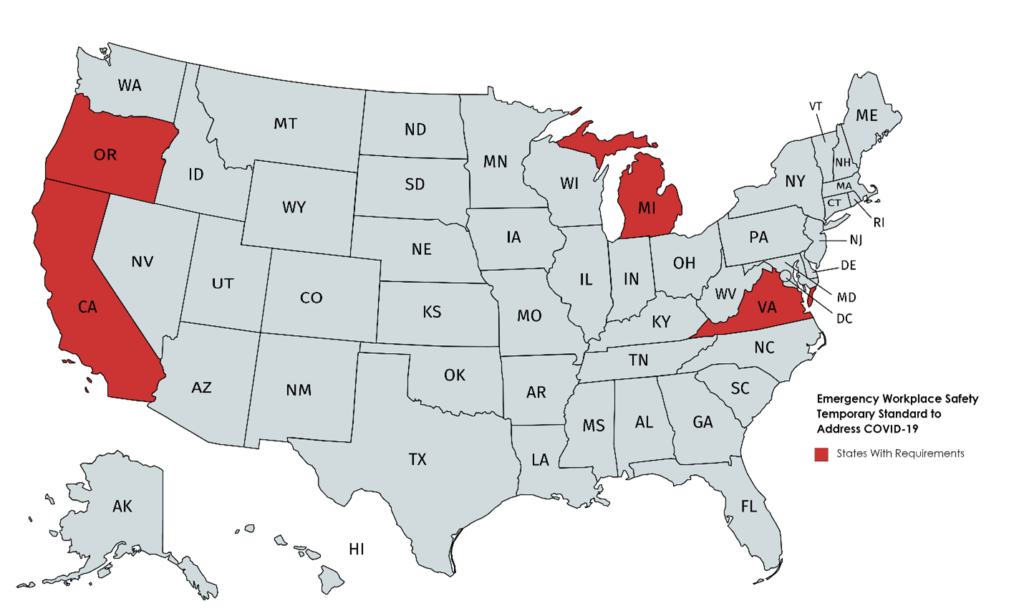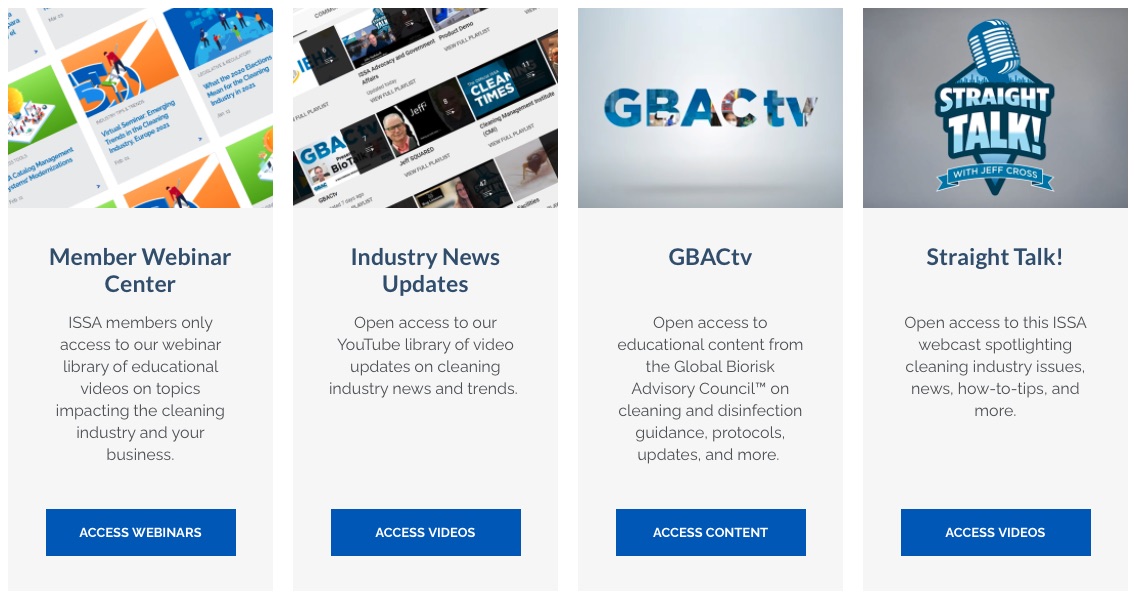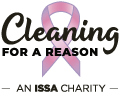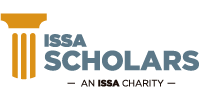News
COVID-19 Emergency Workplace Standards
November 24, 2020
A patchwork of federal and state-level guidance is being implemented across the United States that address reopening workplaces following COVID-19-induced shutdowns. This page, which ISSA is continually updating, provides resources for our members on such guidance at the federal and international levels, as well as information on enforceable emergency workplace standards or rules that some states have implemented in the–at present–absence of federal standards to protect workers from COVID-19 in the workplace. Many of these enforceable rules have specific requirements related to the use of personal protective equipment, cleaning, disinfecting, and hand hygiene, which are of specific relevance to the cleaning industry.
Numerous states and municipalities also have created their own COVID-19 worker safety-related guidance, executive orders, and protective ordinances. In these cases, we encourage ISSA members to contact their local governments directly for information.
At the national and international levels
From federal agencies:
- OSHA: Protecting Workers: Guidance on Mitigating and Preventing the Spread of COVID-19 in the Workplace
- CDC: Reopening Guidance for Cleaning and Disinfecting Public Spaces, Workplaces, Businesses, Schools, and Homes
- CDC: COVID-19 Employer Information for Office Buildings
- CDC: Cleaning and Disinfecting Your Facility
- EPA, CDC Release Guidance for Cleaning and Disinfecting Spaces Where Americans Live, Work, and Play
- OSHA: Guidance on Preparing Workplaces for COVID-19
- OSHA: Guidance on Returning to Work
From international agencies:
- COVID-19: IFRC, UNICEF and WHO issue guidance to protect children and support safe school operations
- WHO: Getting your workplace ready for COVID-19
- WHO: Cleaning and disinfection of environmental surfaces in the context of COVID-19
- WHO: Infection prevention and control during health care when coronavirus disease (COVID-19) is suspected or confirmed
- WHO: Overview of Public Health and Social Measures in the context of COVID-19
At the state level

California – The board overseeing California’s Division of Occupational Safety and Health, known as Cal/OSHA, voted unanimously on November 19, 2020 to advance a slate of workplace protocols. Under the new standards, employers would have to create written COVID-19 prevention policies that identify and mitigate workplace-specific hazards. Employers also would have to provide face coverings and personal protective equipment at no cost to workers.
The new standards could take effect within a few weeks pending a review and comment period. The rules would apply to the employers of most private- and public-sector workers statewide, except those in healthcare who are already covered under a 2009 state law governing infectious airborne illnesses. California’s emergency rules will likely be in place for six months, though officials are expected to convene an advisory committee to consider whether permanent policies should be adopted to safeguard against future pandemics.
On June 17, 2021, the Cal/OSHA Standards Board voted to re-adopt the COVID-19 Prevention Emergency Temporary Standards with important amendments, part of which included a significant loosening of previous requirements. Following the June 17 vote, California Governor Gavin Newsom signed an executive order to allow the revisions to take effect immediately. The revised regulations include changes to face coverings and physical distancing requirements. More information on the revised COVID-19 Prevention Emergency Temporary Standards can be found in Cal/OSHA’s Frequently Asked Questions.
Michigan – The Michigan Occupational Safety and Health Administration issued emergency COVID-19 rules, which took immediate effect on October 14, 2020 and will remain in effect for six months. MIOSHA’s emergency COVID-19 regulations require virtually all employers in the state to implement risk-reducing measures in the workplace. The main MIOSHA rule requires employers to have a policy prohibiting in-person work when remote work is feasible.
Oregon – Oregon became the third state to implement a temporary rule addressing COVID-19 in all workplaces. The rule is a continuation of existing Oregon Health Authority guidance, which includes physical distance, face masks, and sanitation. The rule took effect on November 16, 2020 and is slated to last until May 2021.
Virginia – Virginia was the first state to issue an emergency temporary standard in July 2020, requiring employers to follow guidelines or face fines. The Virginia Safety and Health Codes Board voted to approve rules for businesses that include social distancing requirements, notifications for employees when a co-worker has tested positive for the virus, and timelines for when employees who recover from the virus can return to work.
On January 13, 2021, Virginia become the first state in the nation to enact a permanent rule requiring employers to take steps to protect workers from COVID-19 infection on the job. The Virginia Safety and Health Codes Board voted to approve the measure, ensuring protections for workers will continue when the state’s emergency temporary standard expires on January 26. The permanent rule largely mirrors the temporary standard, which groups jobs into categories of high, medium, and low exposure risk. It continues a requirement for employers to create a workplace infection protection program and to train workers on how to comply. In addition, the standard sets mandates for on-the-job social distancing, cleaning, and wearing of face masks. The permanent rule is expected to be implemented before January 26; the new rule is poised to take effect following a review by the office of Governor Ralph Northam (D) and publication in a Richmond, Virginia print newspaper.
Additional state-level resource:
To provide the latest guidance and information to America’s employers, the U.S. Chamber of Commerce launched an interactive state map and state guides. This resource provides the latest workplace guidance, including cleaning/sanitation procedures, as well as timelines and other critical information needed for businesses to “safely and sustainably” restart.
U.S. Chamber of Commerce: State By State Business Reopening Guidance
Please note this document is advisory in nature and subject to frequent change.
ISSA has made every attempt to ensure the accuracy and reliability of the information provided on this web page. However, due to the quickly evolving nature of the coronavirus crisis, the underlying information is constantly changing. Therefore, this information is provided “as is” without warranty of any kind. ISSA does not accept any responsibility or liability for the accuracy, content, completeness, legality, or reliability of the information contained on this web page. We encourage you to consult your state and local governments for more specific information.
Updated 6/21/21





